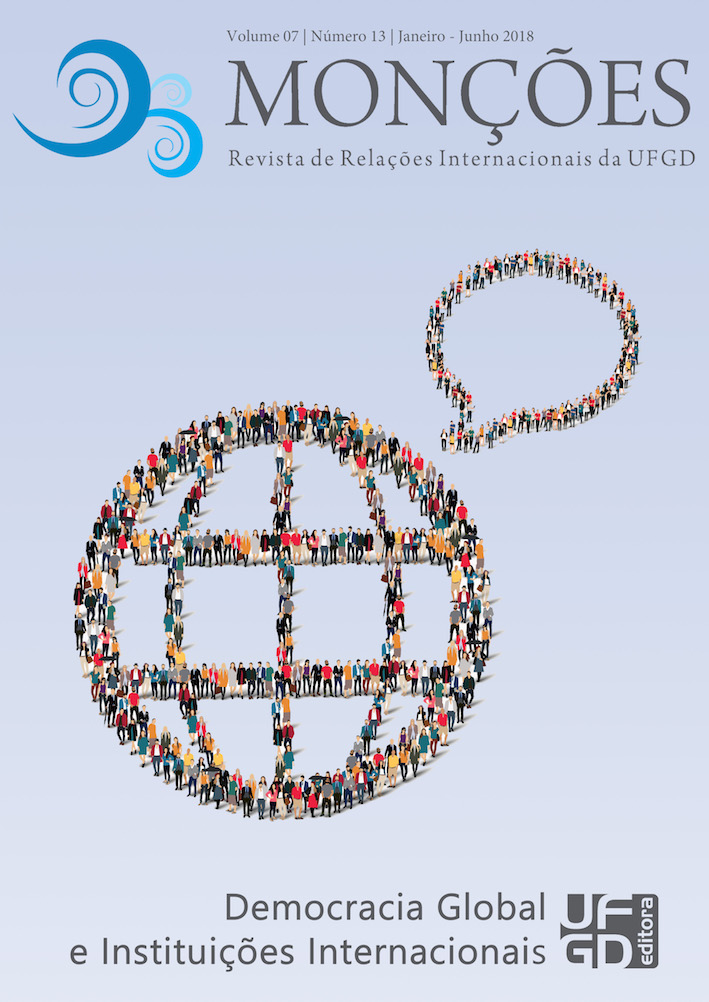Global democracy and international institutions: an introduction
DOI:
https://doi.org/10.30612/rmufgd.v7i13.8737Keywords:
Global democracy, International Politics, International OrganizationsAbstract
The motivation of the Special Edition “Global Democracy and International Institutions”, to be printed in the present issue of Revista Monções, was born from the following diagnosis: the debate about the democratization of international politics is definitely something that is currently imposed, not being allowed to the discussions on International Relations in Brazil the option to pass it off. On the one hand, despite all contemporary crises and turbulences, democracy as a regime of government remains widespread throughout the world. On the other hand, the consciousness of its empirical limitations has never been so acute. Given this, this Special Edition represents a call to the critical and reflexive evaluation of the phenomenon of the democratization of international politics from various analytical angles. Its central objective is to understand the formulations, reformulations and limits of the ways promoted by States, international institutions and other non-state actors to exercise a more plural and open global governance - and, in a very peculiar sense, more " democratic "- amid the complexities, inequalities and instabilities imposed by the conditions of "structural anarchy."
Downloads
References
ABBOTT, K. e Snidal, D. (1997), “Why states act through formal international organizations?”, Journal of Conflict Resolution, 42.
ALGER, C. (2010), “Expanding Governmental Diversity in Global Governance”, Global Governance 16, pp. 59-79.
ARCHIBUGI, Daniele; ARCHIBUGI-KOENIG Mathias, Marchetti, Raffaele. Global democracy: normative and empirical perspectives. Cambridge: Cambridge University Press. 2012.
AXELROD, Robert; KEOHANE, Robert. Achieving Cooperation under Anarchy: Strategies and Institutions. World Politics.1985.
BARNETT, M. e Finnemore, M. (2004), Rules for the World. Cornell University Press.
BARNETT, M; DUVALL; R. Power in Global Governance. Cambridge University Press, 2005.
BOTCHEVA, Liliana; MARTIN, Lisa. L. Institutional Effects on State Behavior: Convergence and Divergence. International Studies Quarterly, v. 45, n. 1, p. 1-26, 2001.
BULL, H.The Anarchical Society. Londres, Macmillan. 1977
COOPER, Andrew F; CHRISTOPHER, W. Hughes; LOMBAERDE, Phillipe de. Introduction: Regionalisation and the taming of globalisation? IN: COOPER, Andrew F; CHRISTOPHER, W. Hughes; LOMBAERDE, Phillipe de. Enhancing Global Governance through Regional Integration, Oxford: Routledge. 2008.
HABERMAS, J. La Constelación Posnacional. Barcelona, Paidós. 1998
HALL, R. e Biersteker, T. The Emergence of Private Authority. Cambridge, CUP. 2002
HAWKINS, D. et al. (org.) Delegation and Agency in International Organizations. Cambridge, CUP. 2006
HELD, D. Global Covenant. Oxford, Polity Press. 2004
HOWSE, R. “The legitimacy of the World Trade Organization” in Coicaud, J.-M. e Heiskanen, V. (org.), in Coicaud, J.-M. e Heiskanen, V. (org.), The Legitimacy of International Organizations. Tóquio, UNU. 2001
KAZANCIGIL, A. “A regulação social e a governança democrática da globalização” in Milani, C. et al. (org.), Democracia e Governança Mundial. Porto Alegre, Editora da Universidade (UFRGS). 2001
KECK, M. “Governance Regimes and the Politics of Discursive Representation” in Piper, N. e Uhlin, A. (org.), Transnational Activism in Asia. Londres, Routledge. 2004.
KEOHANE, R. After Hegemony. Princeton, Princeton University Press. 1984
KEOHANE, R., Macedo, S. e Moravcsik, A., “Democracy-Enhancing Multilateralism”, International Organization, n. 63, pp. 1-31. 2009
KEOHANE, Robert O. Introduction: from interdependence and institutions to globalization and governance in KEOHANE, Robert. O. Power and Governance in a Partially Globalized World. Routledge, 2002.
KRASNER, S. (org.) International Regimes. Stanford, Stanford University. 1983
LANGLOIS, Anthony J; Soltan, Karol Edward. Global democracy and its difficulties. Routledge, 2009
MARCHETTI, Raffaele. Global Democracy: for and against – ethical theory, institutional design and social struggles. London: Routledge, 2008
MARCHETTI, R. “Modeling Transnational Politics”. Paper apresentado no 22º Congresso Mundial da Associação Internacional de Ciência Política (IPSA). Madrid, Espanha, julho de 2012.
MARKS, S. “Democracy and international governance” in Coicaud, J.-M. e Heiskanen, V. (org.), The Legitimacy of International Organizations. Tóquio, UNU, 2001
NAJEM,Tom Pierre; MARTIN; Hetherington. Good Governance In The Middle East Oil Monarchies. Routledge Curzon, London, 2003
ROSENAU, J. e Czempiel, E.-O. Governança sem Governo. Brasília, Editora UnB, 1992
RUGGIE, J. “International Regimes, Transactions, and Change: Embedded Liberalism in the Postwar Economic Order”, International Organization, 36 (2), 1982
SINGER, P. Um Só Mundo. São Paulo, Martins Fontes, 2004
WALTZ, K. Theory of International Politics. New York, McGraw Hill, 1979
WEISS, Thomas G., “Governance, Good Governance and Global Governance: Conceptual and Actual Challenges,” Third World Quarterly. 2000.
WENDT, A., Social Theory of International Relations. Cambridge, CUP. 1996
WHITMAN, Jim. The Limits of Global Governance. Routledge. 2005.
WIGHT, M. “Why is there no international theory?” in Wight, M. e Butterfield, H. (eds.), Diplomatic Investigations. London, Unwin, 1966
WOODS, N. The Globalizers: The IMF, the World Bank, and their Borrowers. Ithaca and London, Cornell University Press, 2006
YOUNG, O. Governance in World Affairs. Cornell University Press, 1999
Downloads
Published
How to Cite
Issue
Section
License
- Os autores e autoras mantêm os direitos autorais e concedem à revista o direito de primeira publicação, com o trabalho simultaneamente licenciado sob a Creative Commons Atribuição-NãoComercial-CompartilhaIgual 3.0 Brasil. que permite o compartilhamento do trabalho com reconhecimento da autoria e publicação inicial nesta revista.
- Autores e autoras têm autorização para assumir contratos adicionais separadamente, para distribuição não-exclusiva da versão do trabalho publicada nesta revista (ex.: publicar em repositório institucional ou como capítulo de livro), com reconhecimento de autoria e publicação inicial nesta revista.
- Autores e autoras têm permissão e são estimulados a publicar e distribuir seu trabalho online (ex.: em repositórios institucionais ou na sua página pessoal) a qualquer ponto antes ou durante o processo editorial, já que isso pode gerar alterações produtivas, bem como aumentar o impacto e a citação do trabalho publicado, porém invariavelmente com o reconhecimento de autoria e publicação inicial nesta revista.


